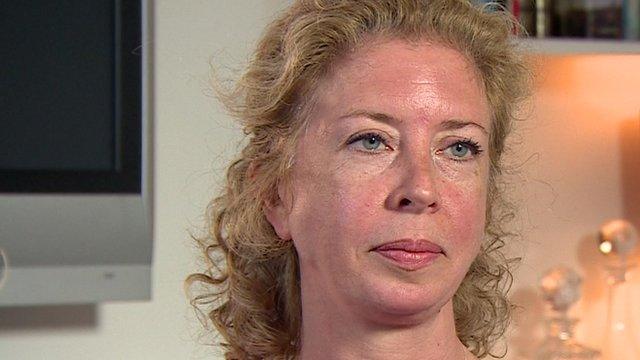Anti-doping: Whistleblower accuses Ukad of 'catastrophic failure'
- Published
Ukad accused of 'catastrophic failure'
The whistleblower at the centre of doping allegations against a London-based doctor has accused the UK Anti-Doping Agency of a "catastrophic failure".
Speaking to BBC Sport, former amateur cyclist and drugs cheat Dan Stevens said the organisation had "absolutely no reason to not investigate" his warnings over Dr Mark Bonar.
Bonar was caught on camera by the Sunday Times, allegedly claiming to have prescribed banned substances to 150 athletes, including Premier League footballers.
Three Premier League clubs issued statements denying their players had used performance-enhancing drugs.
Bonar also denies any wrongdoing.
Ukad says it did begin an investigation into Bonar but found that he was outside of its jurisdiction as he was not governed by a sport.
It decided not to pass the case to the General Medical Council (GMC) or to contact the private clinician.
The government has ordered an urgent inquiry into Ukad's handling of the case.
Prescribed 'banned products'
Stevens, 40, was originally banned for two years for breaching anti-doping rules in 2014 when he refused to provide an out-of-competition sample.
Hoping to have his suspension reduced, he then approached Ukad with evidence that he says indicated Bonar had allegedly prescribed him performance-enhancing drugs.
Stevens, who had originally wished to remain anonymous before his identity was revealed in the media this week, described how he came to meet with Bonar.
"I started struggling to recover, and I saw a GP, who said I had low testosterone levels," he said.
"It was shortly after that I met Dr Bonar. I found him online - he was advertising testosterone replacement therapy.
"And that was the intention - there was no intention to cheat, no intention to improve my performance.
"Bonar seemed like quite a sensible, good doctor. He knew what he was talking about.
"He'd happily write numerous prescriptions every time you saw the guy, and his words were: 'It's really down to you whether you want to use those or not'.
"And over the months I was working with the guy, it became increasingly concerning that he was prepared to just keep writing prescriptions for banned products.
More on alleged doping in sport | |
|---|---|
"He started talking about other drugs - like human growth hormone and EPO - and suggested that he worked with a number of other clients, and those clients were already taking this, and if you wanted to compete at a high level this is what everyone does.
"He suggested that it was an endemic problem, and he referenced a lot of other clients that he dealt with, one of them being a British boxer, but he didn't give me the names.
"I think it was quite revolutionary to meet with a British doctor in a private clinic who was telling me that a number of high-profile British athletes, cyclists, runners, boxers, cricketers and footballers were using these substances to improve their performance. His words were that this is what is needed to be done to move up a level.
"So it was quite shocking, but at the same time it was quite scary that the scale of the problem was that large, and that this doctor was so open with the problem. I almost felt like he was trying to push drugs on me."
"I tried EPO out of curiosity and the revolution for me when I was using it was the massive improvement in performance. The gains are just unbelievable."
In a statement, Bonar told BBC Sport: "Dan Stevens presented with some personal medical issues. I treated symptoms appropriately and I did not prescribe for the purposes of performance enhancement."
Stevens disputes this. After being banned, Stevens tried to assist Ukad with a view to getting a reduced suspension.
His sentence was cut by three months for co-operating with another doping inquiry, world governing body the UCI's Circ report into cheating in cycling.
He told Ukad about Bonar and says he produced five hand-written prescriptions.
Offering my services was 'the worst thing'
Ukad say the whistleblower's notes were given to an independent medical expert for analysis, but it decided there was not sufficient evidence to pass on the case to the GMC.
Stevens then tipped off The Sunday Times, leading to last weekend's revelations and the scrutiny of related wider issues, such as the intelligence-gathering process and the treatment of whistleblowers in the fight against doping.
"I would describe it as a catastrophic failure," said Stevens.
"Ukad had absolutely no reason to not investigate Dr Bonar. They had every reason to investigate the doctor, they were given prescriptions that the doctor had produced - those prescriptions included the doctor's GMC registration number.
"They were prescribed via British chemists. Ukad have got absolutely no excuse for not investigating this, and that is a massive concern.
"It's horrendous. It's diabolical. And I don't think it's by accident either.
"I think the public tone doesn't want whistleblowers and I think behind closed doors the objective is not to have those whistleblowers.
"I think the worst thing I could have ever done with Ukad was offer my services, to blow the whistle on what had been happening, because I think they genuinely didn't want someone to do that."
When challenged about the need for further corroborating evidence, Stevens maintains that what he provided should have been enough.
"There is absolutely no reason why Ukad couldn't have picked up the phone and said to the GMC: 'Hey, look, there's a guy who's come to see us - the doctor's been prescribing banned substances to athletes. Can you investigate it?"
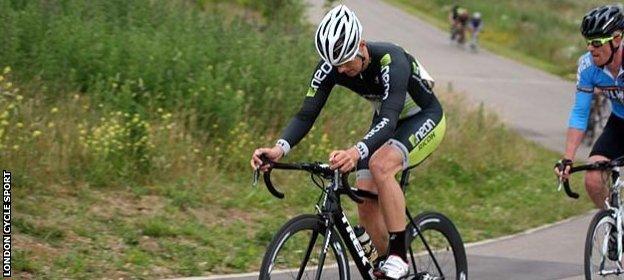
Stevens was banned from competition for 21 months after failing to supply a sample in January 2014
In a statement, a Ukad spokeswoman told BBC Sport: "In addition to Ukad's previous statement,, external it is important to highlight that Ukad is investigating the claims made by the Sunday Times.
"We must also clarify that Ukad does not have the names of any sportspeople who may have been treated by Dr Bonar other than the sportsperson concerned.
"The Ukad board has appointed [former assistant chief constable Andy Ward to lead an independent review into Ukad's handling of intelligence in 2014 in relation to Dr Bonar and the wider investigation which took place following the sportsperson's interviews.
"Ukad will fully co-operate with the independent review."
Time to 'criminalise' doping?
Stevens believes radical changes are required, including the introduction of the criminalisation of doping.
He added: "I think the whole system needs a root-and-branch rewrite. I think the way things are at the moment, it's just clearly not working.
"I think doping in the UK needs to be criminalised. One, it's a bigger deterrent, two, it gives the athletes far greater protection [by taking the process out of the anti-doping authorities' system]."
Despite spending tens of thousands of pounds on legal challenges in his attempt to get his ban reduced, Stevens says he has no regrets about being a whistleblower.
"I think I have contributed quite a lot to the present doping situation in the UK and hopefully the information I've given you and other people will allow the public to see what really is going on - how whistleblowers really are dealt with."
Have you added the new Top Story alerts in the BBC Sport app? Simply head to the menu in the app - and don't forget you can also add score alerts for the Six Nations, your football team and more.
- Published5 April 2016
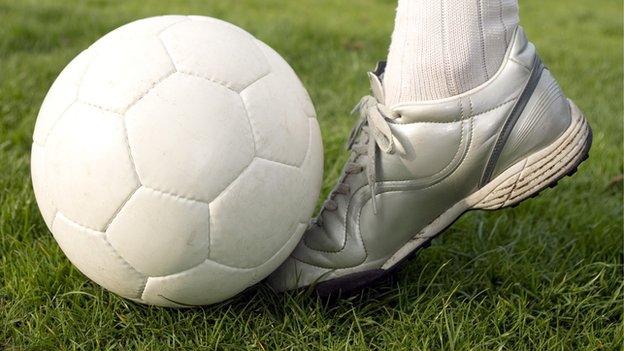
- Published3 April 2016
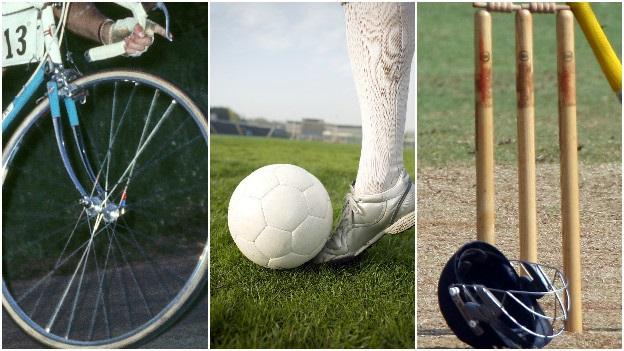
- Published9 November 2015
- Attribution
- Published8 September 2015
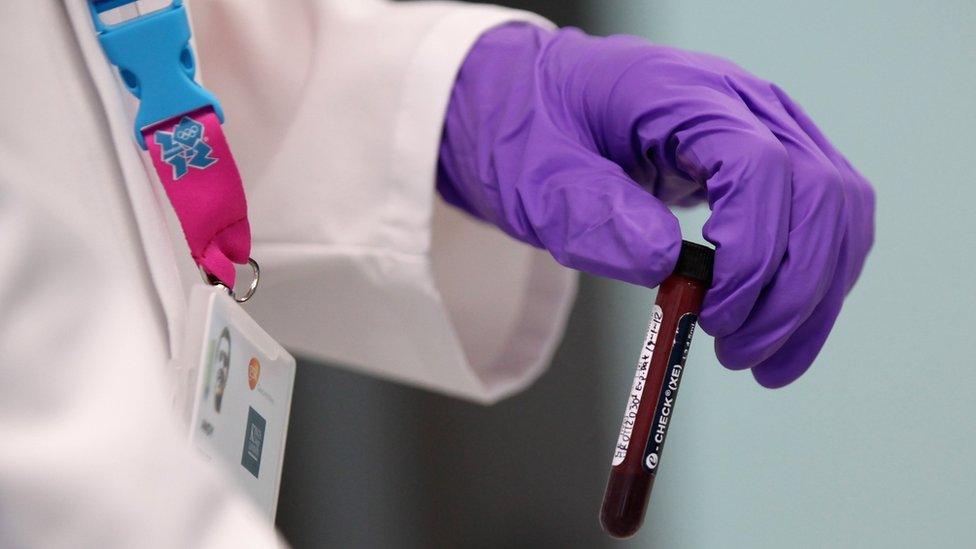
- Attribution
- Published9 August 2015
